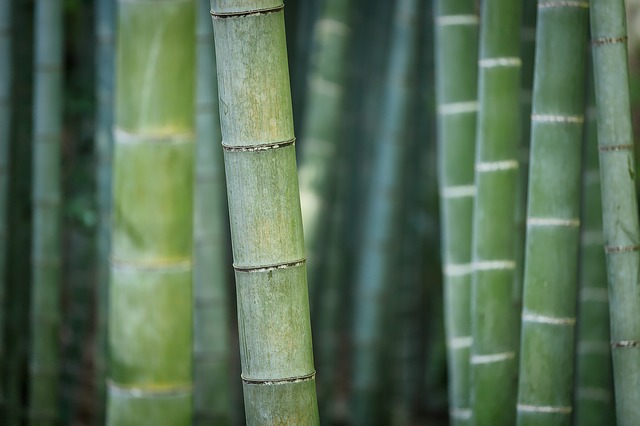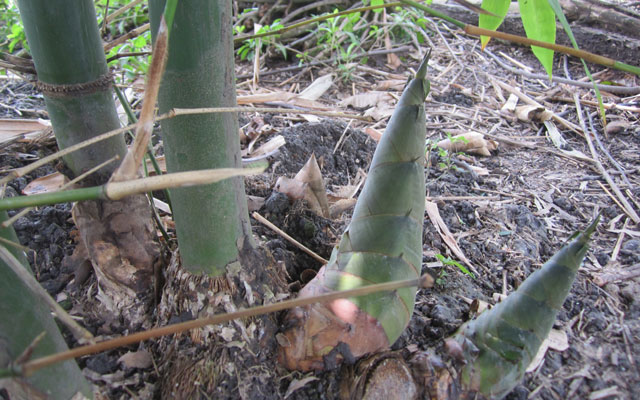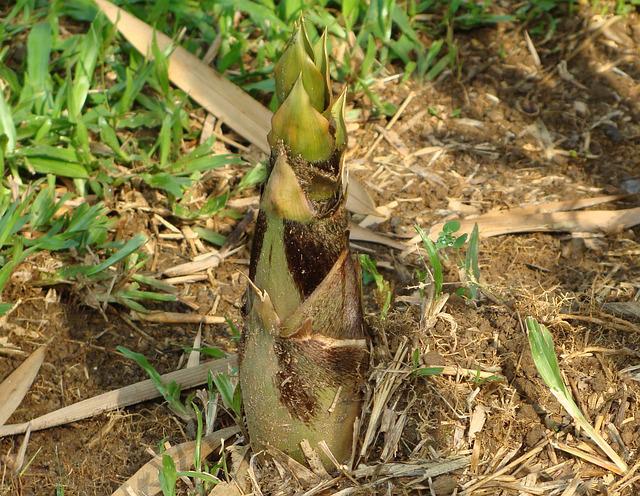Originally posted on June 24, 2022 @ 7:48 am
Bamboo is grass that grows in many parts of the world. It has been used throughout history for various purposes, including building materials, food, and medicine. Some people may wonder if bamboo is edible. Can you eat bamboo? What are the nutritional benefits of eating bamboo? This article will explore these questions and provide answers based on current research.

Table of Contents
What Is Bamboo?
Bamboo is a grass that is indigenous to Asia. It is one of the fastest-growing plants in the world, and can grow up to four feet in one day! Bamboo is very strong and versatile and has been used for centuries to make everything from houses and bridges to furniture and paper.
Today, bamboo is becoming more popular as a sustainable building material, as it is a renewable resource that can be quickly grown and harvested. Bamboo is also used in many different industries, such as the food, paper, and textile industries.
Can You Eat Bamboo?

Bamboo is commonly used in many Asian dishes, such as stir-fries and soups. Bamboo shoots are the bamboo plant’s immature, fragile shoots. They have a crunchy texture and a slightly sweet flavor.
Bamboo shoots are rich in nutrients, including fiber, vitamin C, potassium, and magnesium. They also contain a compound known as D-glucarate, which has been shown to have cancer-preventive properties.
Bamboo shoots are available fresh, canned, or dried. When buying fresh bamboo shoots, look for ones that are firm and free of blemishes. Those that are mushy or have brown stains should be avoided. Canned bamboo shoots are a convenient option and are typically found in the Asian section of supermarkets.
How To Choose Bamboo Shoots?

When choosing bamboo to eat, there are several things you need to consider in order to ensure that you’re getting the best possible product. Here are some tips on how to choose bamboo to eat:
#Types of bamboo
Another thing to consider is the type of bamboo you’re eating. There are two main types – white and yellow. White bamboo is softer and easier to digest, while yellow bamboo is tougher and takes longer to cook. If you’re not sure which one to choose, ask your local grocer or health food store for advice.
#Flavor of the bamboo
Some types of bamboo have a very strong flavor that some people may not enjoy. Snap a small piece off of the bamboo culm and chew on it. It should be tender and slightly sweet in taste. If it’s tough or overly fibrous, it’s not ready to eat yet.
#Culms of the bamboo
They should be straight and free of any visible damage or blemishes. Avoid bamboo that has been bent or damaged in any way, as this can affect its flavor.
#Inspect the nodes of the bamboo culms
These should be firm and plump, without any signs of decay or damage. Damaged nodes can cause the bamboo to become bitter in taste.
#Smell the bamboo culms
They should have a fresh, grassy aroma. If they smell musty or unpleasant, it’s best to avoid them.
How To Prepare Bamboo Shoots?
Depending on the recipe you’re following, the preparation process may vary slightly. However, there are some basic steps that remain the same no matter what dish you’re making. Here’s a step-by-step guide to getting started:
1. Start by rinsing the bamboo under cold water. This will help remove any dirt or debris that may be clinging to the surface.
2. Next, use a sharp knife to slice the bamboo into thin pieces. The thickness of these slices will depend on your personal preference and the recipe you’re using. Just be sure not to cut yourself in the process!
3. Once the ends are trimmed, you can start cooking the bamboo. There are a few different ways that you can cook it, but steaming is generally the best method. You can either steam the bamboo in a steamer basket or you can boil it in water for about 10 minutes.
4. Once the bamboo is cooked, you can add it to any dish that you like. It goes great in stir-fries, soups, and even salads. Bamboo is a versatile ingredient that can be used in a variety of different dishes.
5. And that’s it! Once the bamboo is cooked, it’s ready to be used in any recipe you like. Enjoy!
What Are The Benefits Of Eating Bamboo?
In fact, bamboo is a popular food source in many parts of the world, and it offers a range of health benefits. Here are just a few of the reasons why you should consider adding bamboo to your diet:
Bamboo is packed with nutrients
Bamboo shoots are an excellent source of vitamins and minerals, including vitamin C, potassium, and magnesium. They also contain fiber and protein, making them a filling and nutritious option.
Bamboo can help boost your immune system
Vitamin C is essential for maintaining a strong immune system, and bamboo is a great source of this nutrient. In fact, just one cup of bamboo shoots contains nearly 20% of your recommended daily intake of vitamin C.
Bamboo may help lower blood pressure
Potassium is known for its ability to help lower blood pressure, and bamboo is a good source of this mineral. In addition, the magnesium in bamboo can also help to reduce blood pressure.
Bamboo may aid in weight loss
If you’re looking to lose weight, bamboo could be a helpful addition to your diet. That’s because the fiber in bamboo helps keep you feeling full, so you’re less likely to overeat.
Bamboo may help improve digestion
The fiber in bamboo also helps to promote regularity and prevent constipation. In addition, bamboo contains a type of prebiotic fiber that can help feed the friendly bacteria in your gut.
Bamboo may have anti-inflammatory properties
Some research suggests that bamboo may contain compounds that can help reduce inflammation. This could be beneficial for those who suffer from conditions like arthritis or inflammatory bowel disease.
Bamboo is environmentally friendly
Bamboo is an extremely sustainable crop that grows quickly and doesn’t require the use of pesticides or herbicides. It’s also biodegradable, so it won’t contribute to landfill waste.
Potential Dangers Of Eating Bamboo
Despite the fact that bamboo is a popular food source in many parts of the world, there are potential dangers associated with eating this plant.
- High levels of arsenic
Another potential danger of eating bamboo is that it can contain high levels of arsenic. Arsenic is a poisonous chemical element that can cause a variety of health problems, including cancer. Therefore, it is important to only eat bamboo that has been properly prepared to reduce the risk of arsenic poisoning.
2. High levels of silica
Bamboo can also contain high levels of silica. Silica is a mineral that can be harmful to the lungs if inhaled. Therefore, it is important to avoid eating bamboo that has been burned or smoked, as this can increase the amount of silica in the plant.
3. Choking hazard
Another potential danger of eating bamboo is that it can be a choking hazard. This is because the plant’s fibrous nature can make it tough to chew and swallow. If you do not chew your food properly, you could end up choking on it.
Where Place To Buy Safe Bamboo?
If you’re looking for safe, delicious bamboo shoots, you’ll want to check out these five great places to buy them.
#1. Amazon
Amazon is a great place to buy bamboo shoots because they have a wide selection and offer great prices. You can find many different brands and varieties of bamboo shoots on Amazon, so you’re sure to find the perfect one for your needs.
#2. Walmart
Walmart is another great option for buying bamboo shoots. They offer a wide selection and competitive prices. You can find many different brands and varieties of bamboo shoots at Walmart, so you’re sure to find the perfect one for your needs.
#3. Target
Target is another great place to buy bamboo shoots. They offer a wide selection and competitive prices. You can find many different brands and varieties of bamboo shoots at Target, so you’re sure to find the perfect one for your needs.
#4. Whole Foods Market
Whole Foods Market is a great place to buy bamboo shoots because they offer a wide selection of organic and natural options. You can find many different brands and varieties of bamboo shoots at Whole Foods Market, so you’re sure to find the perfect one for your needs.
#5. Local Asian Grocery Store
If you have a local Asian grocery store, they are likely to sell bamboo shoots. This is a great place to buy bamboo shoots because you can find a wide selection and competitive prices. You can find many different brands and varieties of bamboo shoots at your local Asian grocery store, so you’re sure to find the perfect one for your needs.
What Are The Differences Between White Bamboo And Yellow Bamboo?
White bamboo shoot has a white skin and is typically harvested in spring. Yellow bamboo shoot has a yellow or brown skin and is harvested in autumn.
White bamboo shoot is often used in stir-fries, while yellow bamboo shoot is often used in soups and salads.
Yellow bamboo shoot has a strong flavor, while white bamboo shoot is more delicate. Yellow bamboo shoot is also more fibrous.

Nutritional Information In Bamboo
When it comes to nutritional value, bamboo is an excellent source of vitamins and minerals. In fact, bamboo is one of the most nutrient-dense foods on the planet. Just 100 grams of bamboo shoots (the edible part of the plant) contain:
- Vitamin C: 27% of the Daily Value (DV)
- Vitamin B6: 19% of the DV
- Vitamin E: 11% of the DV
- Riboflavin: 10% of the DV
- Folate: 9% of the DV
- Potassium: 8% of the DV
- Magnesium: 7% of the DV
- phosphorus: 7% of the DV
- Iron: 6% of the DV
- Zinc: 5% of the DV
Additionally, bamboo is a good source of dietary fiber and protein. It’s also low in calories and fat. All of these nutrients make bamboo an excellent food for people who are looking to improve their health.
FAQs About Can You Eat Bamboo
Refer to the commonly asked questions below to find out if can you eat bamboo?.
- What are some recipes that include bamboo?
There are many recipes that include bamboo. Some popular dishes include bamboo shoots with chicken, bamboo rice, and stir-fried bamboo.
2. Is bamboo a good food for people with diabetes?
Yes, bamboo is a good food for people with diabetes. Bamboo is low in sugar and calories, and it is a good source of fiber. Additionally, bamboo may help to regulate blood sugar levels.
3. What are some other uses for bamboo?
Bamboo can also be used for other purposes, such as making furniture, flooring, and paper. Additionally, bamboo charcoal is a popular ingredient in many beauty products.
4. Is bamboo safe for pregnant women to eat?
There is no scientific evidence to support the claim that bamboo is safe for pregnant women to eat. However, since bamboo is high in fiber and low in calories, it may help to prevent constipation during pregnancy.
5. What parts of bamboo are edible?
The shoots and leaves of bamboo are the most commonly consumed parts of the plant. The shoots can be cooked and eaten like asparagus or green beans. The leaves can be used to make tea or added to soups and stir-fries.
Conclusion – Can You Eat Bamboo
Bamboo is a great sustainable resource to consider for your next project. It is strong, durable, and grows quickly without the need for pesticides or fertilizers. With the increasing popularity of bamboo flooring and other products, it’s important to be aware of the different types of bamboo available and how to care for them.
We hope this article has provided you with all the information about can you eat bamboo for you to get started with bamboo in your own home or business.
See also:
Leave a Reply